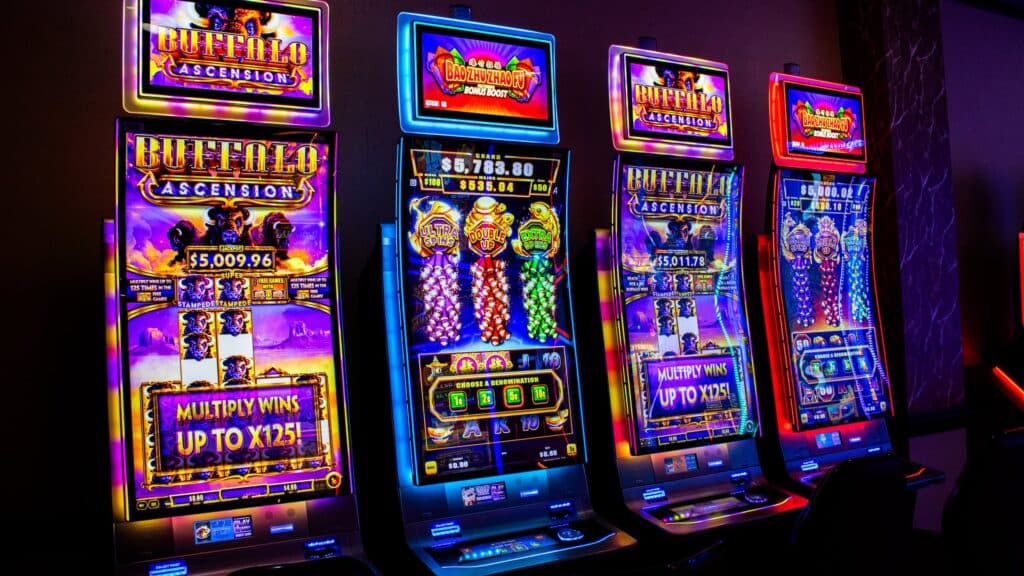Exploring innovations in casino game technology reveals a dynamic intersection of entertainment and cutting-edge advancements, transforming how both seasoned and novice gamblers engage with their favorite pastimes.
The Digital Revolution in Casino Gaming
The advent of the internet marked a pivotal shift in the casino industry, transitioning traditional brick-and-mortar experiences to the digital realm. This transformation began modestly but has since exploded into a sophisticated ecosystem of online casinos, offering a vast array of games accessible from anywhere at any time. The initial innovation was simply replicating classic casino games online, but rapid technological progress has spurred continuous evolution.
Early online casinos featured basic versions of slots, blackjack, and roulette. As technology advanced, so did the complexity and appeal of online casino games. Improved graphics, faster internet speeds, and more secure payment gateways contributed to the growth of online gambling platforms. Today, players enjoy live dealer games, 3D slots, and interactive gaming environments that closely mimic the excitement of a physical casino, all from the comfort of their homes.
Mobile Gaming and Accessibility
The proliferation of smartphones and tablets has further revolutionized casino game technology. Mobile gaming has become a dominant force, offering unparalleled convenience and accessibility. Players can now engage in real-money gambling on the go, whether commuting, waiting, or relaxing. This accessibility has broadened the player base and increased engagement, making casino games more integrated into daily life for many.
Mobile casino platforms are designed with user-friendly interfaces, optimized for smaller screens and touch controls. Developers prioritize seamless gameplay, secure transactions, and a wide selection of games compatible with various mobile operating systems. This mobile-first approach has been crucial in attracting a younger demographic and expanding the overall online gambling market. The convenience factor of mobile casinos cannot be overstated; it has redefined when and where people can access casino entertainment.
Artificial Intelligence and Personalized Gaming Experiences
Artificial intelligence (AI) is rapidly becoming a cornerstone of innovation in casino game technology, offering possibilities that were once considered science fiction. AI is being used to personalize gaming experiences, enhance security, and promote responsible gambling. Its integration is multifaceted, impacting both player engagement and operational efficiency.
Personalized gaming is a key application of AI. By analyzing player data – preferences, playing habits, and spending patterns – AI algorithms can tailor game recommendations, bonuses, and even game difficulty levels to individual players. This level of customization enhances player satisfaction and engagement, making the gaming experience more relevant and enjoyable. Imagine a casino platform that suggests games based on your past successes and interests, or adjusts bonus offers to match your playing style; this is the reality AI is creating.
AI in Security and Fraud Detection
Beyond personalization, AI plays a crucial role in bolstering security within online casinos. AI-powered systems can detect fraudulent activities and identify suspicious patterns far more effectively than traditional methods. These systems monitor transactions, player behavior, and network traffic in real-time, flagging anomalies that might indicate cheating, money laundering, or other illicit activities. This proactive approach to security is essential for maintaining trust and integrity in the online gambling environment.
AI algorithms can analyze vast datasets to identify subtle indicators of fraud that might be missed by human oversight. For example, rapid changes in betting patterns, unusual withdrawal requests, or multiple accounts originating from the same IP address can trigger alerts for further investigation. This sophisticated level of security not only protects the casino's interests but also safeguards players from potential scams and ensures a fair gaming environment. The integration of AI in security is an ongoing process, constantly evolving to stay ahead of increasingly sophisticated cyber threats.
Virtual Reality and Augmented Reality: Immersive Gaming
Virtual Reality (VR) and Augmented Reality (AR) technologies are poised to deliver the next major leap in casino game technology, promising truly immersive and interactive gaming experiences. While still in relatively early stages of widespread adoption in the casino industry, VR and AR hold immense potential to revolutionize how players engage with casino games.
VR casinos aim to transport players into fully realized digital casino environments. Imagine donning a VR headset and stepping into a virtual casino lobby, complete with realistic sounds, visuals, and social interactions. Players could walk around, interact with virtual dealers and other players, and experience the atmosphere of a real casino without leaving their homes. VR technology offers the potential to recreate the social and sensory aspects of land-based casinos in the digital world, appealing to players who miss the communal experience of traditional gambling.
Augmented Reality: Blending Digital and Physical Worlds
Augmented Reality offers a different, yet equally compelling, approach to immersive gaming. AR technology overlays digital elements onto the real world, creating hybrid gaming experiences. For example, AR could transform a player's living room into a virtual blackjack table, with digital cards and chips appearing on their coffee table. AR applications in casinos could also enhance the experience in physical locations, providing interactive overlays on slot machines or displaying game information directly onto the gaming surface. AR bridges the gap between the digital and physical, offering innovative ways to enhance both online and land-based casino environments.
The development of VR and AR casino games is ongoing, with advancements in headset technology, software development, and network capabilities continually pushing the boundaries of what's possible. While challenges remain in terms of cost, accessibility, and content development, the potential of VR and AR to transform casino gaming is undeniable. These technologies represent a significant investment in the future of immersive entertainment within the gambling industry.
Blockchain and Cryptocurrency in Online Casinos
Blockchain technology and cryptocurrencies are introducing new paradigms in online casino operations, focusing on enhanced security, transparency, and faster transactions. The decentralized nature of blockchain offers several advantages for online gambling platforms and players alike.
Cryptocurrencies like Bitcoin, Ethereum, and Litecoin are increasingly accepted in online casinos, providing players with alternative payment methods that often offer faster deposit and withdrawal times compared to traditional banking systems. Transactions made with cryptocurrencies are typically processed more quickly and with lower fees, appealing to players seeking efficiency and cost-effectiveness. Furthermore, the anonymity associated with some cryptocurrencies can be attractive to players who value privacy in their online gambling activities.
Transparency and Provably Fair Gaming
Blockchain technology extends beyond just cryptocurrency payments; it also enables the concept of "provably fair" gaming. In provably fair systems, the algorithms that determine game outcomes are made transparent and verifiable using blockchain. This allows players to independently verify the fairness of each game round, ensuring that the casino is not manipulating results. This level of transparency builds trust and addresses concerns about the integrity of online casino games, a crucial factor for player confidence and industry legitimacy.
Provably fair systems typically use cryptographic hash functions to ensure that game outcomes are predetermined and cannot be altered after the player has placed their bet. Players can use publicly available tools to verify the cryptographic integrity of each game, providing mathematical assurance of fairness. This innovation is particularly significant in an industry where trust is paramount, offering a technological solution to long-standing concerns about game rigging and manipulation. Blockchain's role in promoting transparency and fairness is a major step forward in the evolution of online casino game technology.
Live Dealer Games: Bridging the Gap
Live dealer games represent a significant innovation that bridges the gap between the convenience of online casinos and the social interaction of land-based casinos. These games feature real human dealers streamed live to players' devices, allowing them to participate in games like blackjack, roulette, and baccarat in real-time, interacting with dealers and other players through chat features.
Live dealer technology recreates the atmosphere of a physical casino, providing a more engaging and social experience compared to traditional online casino games that rely solely on computer-generated graphics. Players can observe the dealer shuffling cards, spinning the roulette wheel, and managing the game, adding a layer of authenticity and trust. The ability to interact with dealers and other players enhances the social dimension of online gambling, appealing to players who value the human element of casino gaming.
Technological Infrastructure of Live Dealer Games
The operation of live dealer games relies on sophisticated technological infrastructure, including high-definition cameras, optical character recognition (OCR) technology, and robust streaming capabilities. Cameras capture the live action at the gaming table, OCR technology translates the game state (card values, roulette wheel outcomes) into digital data, and streaming technology delivers the video feed to players in real-time. This complex system requires significant investment and ongoing maintenance to ensure a seamless and reliable gaming experience.
Live dealer studios are typically designed to mimic the ambiance of a real casino, further enhancing the immersive experience. Professional dealers are trained to interact with players and manage the games according to casino rules and etiquette. The combination of live human interaction, real-time gameplay, and high-quality video streaming has made live dealer games a highly popular and enduring innovation in online casino game technology, attracting players who seek a more authentic and engaging online gambling experience.
Skill-Based Casino Games: Appealing to a New Generation
Skill-based casino games are emerging as a novel category, designed to attract a younger generation of players who are accustomed to video games and competitive gaming. These games move away from the traditional model of pure chance, incorporating elements of skill and strategy that can influence game outcomes. This shift is intended to appeal to players who seek more control and agency in their gambling experiences.
Examples of skill-based casino games include games that blend elements of arcade games with gambling mechanics, such as games involving shooting targets, solving puzzles, or racing. These games often feature leaderboards and competitive elements, encouraging players to improve their skills and compete against others. The introduction of skill-based games represents an effort by the casino industry to adapt to changing player preferences and attract a demographic that may find traditional casino games less appealing.
Balancing Skill and Chance
The development of skill-based casino games presents unique challenges in balancing skill and chance to comply with gambling regulations and maintain player fairness. Regulations typically require that casino games have an element of chance, and skill-based games must be carefully designed to ensure that skill does not completely eliminate the element of randomness. The goal is to create games where skill can improve a player's odds, but not guarantee a win, preserving the inherent uncertainty and excitement of gambling.
The integration of skill into casino games is an ongoing area of innovation, with game developers experimenting with various mechanics and formats to find the right balance. Skill-based games have the potential to broaden the appeal of casino gaming to a wider audience, particularly those who enjoy video games and competitive challenges. However, their long-term success will depend on effectively integrating skill elements while maintaining the core principles of fair and regulated gambling.
Responsible Gambling Technologies: Player Protection
Innovation in casino game technology is not solely focused on entertainment and revenue generation; there is also a growing emphasis on responsible gambling technologies. These technologies are designed to promote player protection, prevent problem gambling, and create a safer gambling environment. Responsible gambling features are becoming increasingly integrated into online casino platforms and land-based gaming machines.
Examples of responsible gambling technologies include features that allow players to set deposit limits, spending limits, and time limits for their gaming sessions. Self-exclusion programs, facilitated by technology, allow players to ban themselves from gambling platforms for specified periods. AI-powered monitoring systems can also identify players exhibiting signs of problem gambling behavior, enabling casinos to proactively offer support and intervention. These tools are crucial for fostering a responsible gambling culture and mitigating the potential harms associated with gambling.
Data Analytics for Early Intervention
Data analytics plays a vital role in responsible gambling initiatives. By analyzing player data, casinos can identify patterns of behavior that may indicate problem gambling, such as increased spending, chasing losses, or extended gaming sessions. This data-driven approach allows for early intervention, enabling casinos to reach out to at-risk players with responsible gambling resources and support before problems escalate. Data analytics can also be used to evaluate the effectiveness of responsible gambling measures and refine strategies for player protection.
The integration of responsible gambling technologies is not only ethically sound but also increasingly becoming a regulatory requirement in many jurisdictions. Casinos are recognizing that prioritizing player well-being is essential for the long-term sustainability of the industry. Technological innovations in responsible gambling are a positive trend, demonstrating a commitment to creating a safer and more responsible gambling environment for all players. This focus on player protection is likely to become even more prominent as technology continues to evolve and shape the future of casino gaming.
Conclusion: The Future of Casino Game Technology
The landscape of casino game technology is in constant flux, driven by rapid advancements in digital technologies, changing player preferences, and a growing emphasis on responsible gambling. From the digital revolution of online casinos to the immersive potential of VR and AR, and the transformative impact of AI and blockchain, innovation is reshaping every facet of the casino gaming experience. The future promises even more exciting developments, with technology continuing to blur the lines between the digital and physical worlds, creating more personalized, engaging, and responsible gambling environments. For gamblers, this ongoing evolution means a richer, more diverse, and potentially safer world of casino entertainment, but it also necessitates an informed and balanced approach to navigating these ever-changing landscapes.
External Resources:



